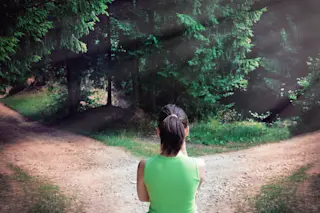To get some perspective on daily troubles, lots of people escape to the outdoors – maybe a weekend bike ride, a fishing trip or a hike – to clear their minds. And now there’s some scientific evidence that it actually helps. Researchers have found that looking at natural landscapes makes people more forward-thinking in their decision-making.
The researchers started by preparing two different photographic slideshows – one depicting lush green natural landscapes, the other depicting urban environments. The team then recruited 47 volunteers and assigned each volunteer to one of the slideshow rooms at random. In each room, volunteers listened to an audio script encouraging them to become immersed in the environment shown in the photographs. After each of the volunteers had watched one or the other of the slideshows, the researchers offered them a choice between two types of financial reward: 100 euros ($135) now, or a larger sum ...













